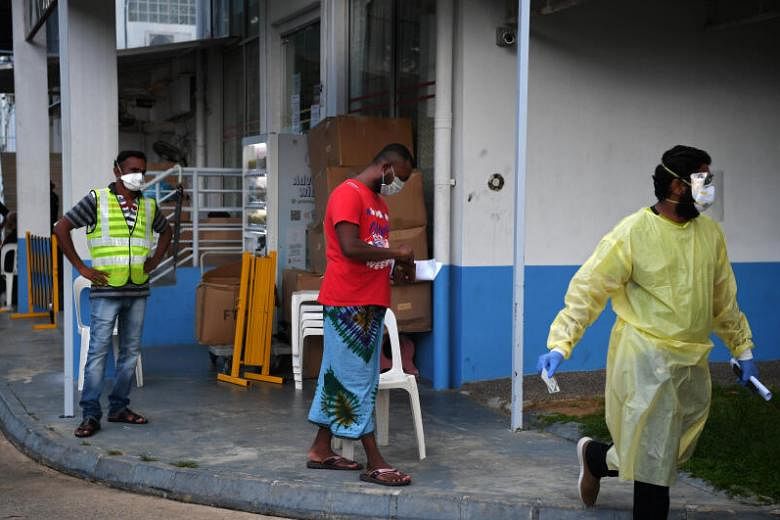SINGAPORE - Although around 247,000 migrant workers living in dormitories have either recovered or tested to be free of Covid-19, the daily new cases continue to remain in the few hundreds.
This is because when infections started to spike in dorms in April, the focus was on making sure workers most at risk were isolated first, said infectious diseases expert Professor Dale Fisher.
This included older ones and those who had other medical conditions, he said, during The Straits Times Covid-19 Webinar on Thursday (July 23).
Such a strategy in taking care of the migrant workers was "very novel", said Prof Fisher, a senior infectious diseases consultant at the National University Hospital.
It helped keep deaths low despite the high living density in the dormitories. This was despite there being no capacity to isolate all the migrant workers as was done for the community cases, said Prof Fisher.
"Part of this is why we've seen over 48,000 cases now, and 27 deaths. The (low mortality) is absolutely staggering. The rest of the world is going, 'How did you do that?'"
Singapore placed a stronger priority on preventing death rather than transmission, added Prof Fisher, who is also chair of the World Health Organisation's Global Outbreak Alert and Response Network steering committee.
As of noon on Thursday, there were 341 new Covid-19 cases confirmed among migrant workers living in dorms.
Dorm infections reached a high of 1,369 new daily cases on April 20.
The number of new cases has been hovering between 100 and 200 a day since the end of last month, but rose to 306 new cases on July 13.
There have been over 300 new cases in the dorms a day since Tuesday (July 21), when numbers hit 399 cases that day.
"There is still some transmission obviously happening, but a lot of the dorms... are being cleared. But it's been slow," said Prof Fisher.
A combination of isolation, serology and polymerase chain reaction tests is used to clear dorms.
As of Wednesday (July 22), 891 dorms, including purpose-built ones and temporary quarters, have been cleared of Covid-19. According to details on the Ministry of Manpower's website, over 1,200 dorms are slated to be cleared in the coming weeks.
Prof Fisher said that all migrant worker dorms should be cleared within weeks or a month.
Minister for National Development Lawrence Wong also said on July 17 that as the country nears the end of clearing the dorms, the number of daily infections among migrant workers can be expected to rise.
This is because for the final phase of testing, many of the workers come from dorms with higher prevalence of coronavirus cases.
Many of the Covid-19 cases that may be picked up later may be older infections, said Mr Wong, who is also co-chair of a multi-ministry task force tackling the outbreak.
Prof Fisher, who said the surge of infections among migrant workers was "a marathon that (the country) didn't want to have", said: "Every effort is being taken to ensure that we're not sending infected men out, and creating new protocols to make sure for those who didn't get infected, there is no new clusters.
"There are even new designs for dormitories that are being built, so we don't have this again."












